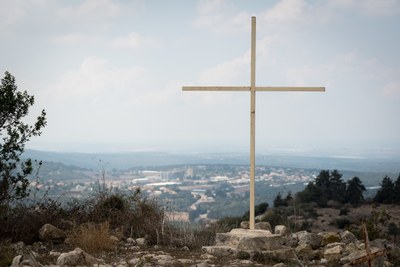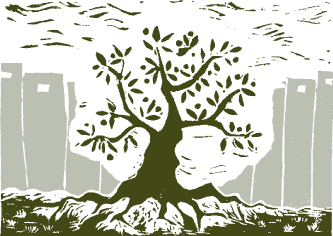Greenwashing Part 2: God of Empire or Jesus- the servant of the oikumene?
The year 2023 has seen Ramadan, Easter, and Passover fall together, which only happens usually once every thirty years. The occasion has seen a heightened situation in Israel and the oPt, especially Jerusalem. The BBC News headline on April 5 2023 read, ‘Ramadan and Passover raise tensions at Jerusalem holy site.’ The headline makes it seem as if the religious festivals created the “tensions”. The situation in Israel and the oPt, we know, is not caused by believers practicing their religions.
See Laura Dobson Colonialism and Christianity in Mandate Palestine (2011) for a great discussion of how the three religions lived peacefully and co-operatively before the British Balfour Declaration in 1917, the British Occupation in 1920 and the State of Israel/Nakba in 1947/8. The situation for Palestinians in Israel/ West Bank/ Gaza is fuelled by one group believing they have a right to an expanse of land that has been lived, loved and cultivated by another.
I took a bus to Bethlehem
Godfrey Meynell
I took a bus to Bethlehem
(Our driver liked the people there.)
We planned to spend some time with them
To show that ‘English people care’.
Is this the way to Bethlehem,
By chanting crowds on Jordan banks,
The sad, attenuated stream,
Those burned-out chariots and tanks?
Yet in those pillaged homes and lands,
With frightened guards and suicides,
Our quiet minds with steady hands
The Everlasting Mercy rides.
In Rosemary Power ed., Refugees from Eden: Voices of Lament, Courage and Justice (Glasgow: Wild Goose Resource Books, 2021) Used with kind permission from www.ionabooks.com.
This poem by Meynell brings out the religious expectations of Bethlehem- through the crowds on the banks chanting, and contrasts it with the daily reality of pillages, destruction and frightened- not excited people. The sarcasm in the line ‘English people care’ is hard hitting, but the last line of the continuing presence of Christ leaves us with some hope.
‘We cannot emphasize our creatureliness without understanding our locality. We are finite, belonging to a particular community, and that finitude is not a barrier to our flourishing, but a gift […] Our sites of loss are particular- creatures, seasons and rhythms, futures, forests that we know’ (Hannah Malcolm, Words for a Dying World, xxxi).

Home is personal. Although, as just stated, religion is not the cause of the occupation/apartheid in Israel/Palestine, religion is being used in multiple ways to overlook the connectedness between people and their land. For instance, Munther Isaac remind Christians when coming on pilgrimage to Israel/Palestine to not just pay attention to the dead stones but also to the living stones- the people who still live in the areas of Jerusalem, Bethlehem, Nazareth and are struggling (Other Side of the Wall, 2020).
The important 2009 Kairos Palestine document marked the Christian Palestinians’ word to the world about what is happening in Palestine. The authors explained that it was is written ‘at this time when we wanted to see the Glory of the grace of God in this land and in the sufferings of its people.’ The document discussed,
‘Israeli settlements ravage our land in the name of God and in the name of force, controlling our natural resources, including water and agricultural land, thus depriving hundreds.’ Kairos Palestine 1.1.2
They explain their theology which continues to live in the land,
‘We believe that the Word of God is a living Word, casting a particular light on each period of history, manifesting to Christian believers what God is saying to us here and now. For this reason, it is unacceptable to transform the Word of God into letters of stone that pervert the love of God and His providence in the life of both peoples and individuals. This is precisely the error in fundamentalist Biblical interpretation that brings us death and destruction when the word of God is petrified and transmitted from generation to generation as a dead letter. This dead letter is used as a weapon in our present history in order to deprive us of our rights in our own land.’ Kairos Palestine 2.2.2
Christian Zionists who read the bible as a ‘dead book’ wish to deprive Palestinian Christians from their homes to give to another. The injustice of this was explained again by the Kairos network in their 2022 Dossier on Israeli Apartheid where Emeritus Palestinian Patriarch Michel Sabbah shares a vision in which the land becomes “like the garden of Eden, a dwelling place for God with humanity, and a homeland for all the children of God.” His vision of an inclusive community expresses the Palestinian Christians’ understanding that the land belongs to God, not to any nation, ethnicity, or religion. We all belong to the land, God’s land. A Dossier on Israeli Apartheid 31.
The historic reality of the land which today constitutes Israel and the oPt however, is that it has always belonged to Empires, side-lining the theology of God’s ownership. Palestinian theologian Mitri Raheb explains,
‘The occupation of Palestine by Israel is just another link in a long chain of uninterrupted occupation. Such occupation is the defining feature of our history, beginning with the Assyrians (722 BC), the Babylonians (587 BC), and the Romans (63 BC), the Byzantines (326), the Arabs (637), the Tartars (1040), the Crusaders (1099), the Ayyubids (1187), the Tartars (1244), the Mamluks (1291), the Mongols (1401), the Ottomans (1516), the British (1917) and the Israelis (1948/67), to name just the major occupiers.’ (Mitri Raheb, Faith in the Face of Empire, 4).
Raheb discusses how despite the multiple Empires; the people have continued to live in and cultivate the land. This people-ecological relationship was denied by the propaganda of the State of Israel. Ilan Pappe, a new Israeli historian, refutes this myth by arguing,
‘Palestine was not an empty land. It was part of a rich and fertile eastern Mediterranean world that in the nineteenth century underwent processes of modernization and nationalization. It was not a desert waiting to come into bloom; it was a pastoral country on the verge of entering the twentieth century as a modern society, with all the benefits and ills of such transformation. Its colonization by the Zionist movement turned this process into a disaster for the majority of the native people living there.’ (Pappe, Ten Myths About Israel, 10).
Edward Said’s ‘Orientalism’ analysis is important here. Romantic pictures of the Middle East were painted, where Muslim and Arab civilization were portrayed as ‘backwards’ and also feminine. The masculine Empire of the West needed to subjugate this irrational way of life through imperialism. Mitri Raheb extends this orientalism narrative to theology today, where Western ‘liberal’ theologians are blind to the plight of Palestinians, already believing that their rational, Western eyes know all the human rights issues they needed to content with. How can their preferential option for the Jewish people and Israel be corrected by an Arab? (See Mitri Raheb, Faith in the Face of Empire, 28-30).

Photo: ©Jan Sutch Pickard
This gendered analysis extends to how we think about the land theologically.
‘For an empire to expand, it needs to control the natural resources of conquered countries and to utilize them for the betterment of the empire rather than for the benefit of the native peoples’ (Mitri Raheb, Faith in the Face of Empire, 57).
Caring and cultivation, sacrifice and patience are viewed as weak/feminine attributes to a god. Allan Boesak terms the opposite- the destructive, dominating, ruthless theology of power- dominion theology.
Theologians Mitri Raheb and Joerg Rieger have distinguished between the God of the Empire and the God of the people. Raheb emphasises how the God of the Palestinian people, in contrast to the victorious God of the empire, ‘was a loser.’ This God watched his people starve, loose their natural resources, loose wars, and be taunted. But, this God was always with them, not just in victory. ‘Jesus revealed this God on a cross, in a situation of terrible agony and pain, when he was brutally crushed by the empire and hung like a rebellious freedom fighter.’ (Raheb in Jione Havea ed. People and the Land, 86-87). Joerg Rieger teases out the relationship between Jesus and Caesar, and asks his readers which they are serving. The most fundamental battle for Christianity he poses is not against the secular, other religions, but within itself between a type of Christianity that poses to be life-giving for all, and other that poses to be life-giving for who they choose. Rieger echoes Raheb saying, ‘Proclaiming the resilient power of God’s weakness was- and still is- a challenge to the dominant powers that model themselves after omnipotence.’ (Rieger, Jesus vs Ceasar, 18.)

Photo: Albin Hillert/WCC
The power of the Lamb of God was his connectedness as he descended to become human and find relationship with the land and the people who inhabit it.
Yohanna Katanacho when exploring the gospel of John explores the metaphor of Christ being the good shepherd. ‘I am the gate; whoever enters through me will be saved. They will come in and go out, and find pasture (10:9).’ As Katanacho comments, geography and salvation here are intertwined. Jesus’ pen door was open to all through his sacrifice as substitutionary atonement. Katanacho continues,
‘Wolves spread in Palestine in the first century that lived in packs that might number from three to twenty […] Hired hands would run for their lives if they saw too many wolves attacking. Some shepherd would try and defend the sheep, but they would not sacrifice themselves for the sake of the sheep. Jesus, though, spoke about a good shepherd who was willing to offer himself for the sake of his sheep, delivering them from death.’
John’s Christocentric vision emphasises how the multiple flocks, under Jesus will be united through a covenant of peace. The good pasture being emphasised in this piece does not discount the land from this relationship.
A theology of empire, dominion and power is not biblical. A theology of servitude, humility, patience, understanding and love is. The story of Babylon exemplifies God’s plan for the world- where all peoples can communicate and live in the land together. Our connectedness to the land and our homes, and our protection and stewardship of it, is our continued worship to God who has provided for us. It is an injustice to God to use our worship as masculine, power-seeking, land-taking exercise. We praise God by honouring all who belonging to God’s land, and protecting our holy relationship with what God has provided.
